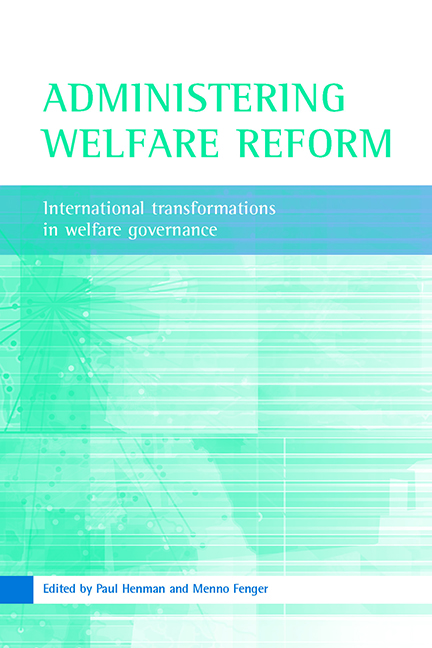Book contents
- Frontmatter
- Contents
- List of tables
- Preface
- Acknowledgements
- List of abbreviations
- Notes on contributors
- one Introduction: administering welfare reform
- two Welfare reform as governance reform: the prospects of a governmentality perspective
- Part One Participants: reforming the agents of welfare delivery
- Part Two Practices: the welfare governance of street-level practices
- Part Three Processes: the changing spaces of welfare governance
- Index
- Also available from The Policy Press
eleven - From government fragmentation to local governance: welfare reforms and lost opportunities in Italy
Published online by Cambridge University Press: 14 January 2022
- Frontmatter
- Contents
- List of tables
- Preface
- Acknowledgements
- List of abbreviations
- Notes on contributors
- one Introduction: administering welfare reform
- two Welfare reform as governance reform: the prospects of a governmentality perspective
- Part One Participants: reforming the agents of welfare delivery
- Part Two Practices: the welfare governance of street-level practices
- Part Three Processes: the changing spaces of welfare governance
- Index
- Also available from The Policy Press
Summary
This chapter discusses the impact of new forms of local governance emerging in Italy as a result of welfare reforms that took place from 1990 to 2004. Particular attention is devoted to activation policies – policies aimed at combating the social exclusion of people in a condition of economic and social need by empowering or obligating individuals to attain autonomy from welfare dependency. These policies have been chosen because they represent a relatively innovative attempt in Europe to institutionalise new participatory practices involving multiple actors at the local level. Significantly, these policies have produced new governance arrangements in Italian social policy. Furthermore, no welfare reform is taking place in Europe without involving activation as a new approach to solving problems that had allegedly oppressed welfare finances and fostered claimants’ passive attitudes. Nonetheless, the meaning of activation is ambiguous, covering quite heterogeneous policies (van Berkel and Hornemann Møller, 2002) and differs across countries.
Despite differences in social and economic policies, there are common features in an overall process of change in most industrialised countries. These include:
• consolidation of unemployment as a structural condition for part of the working-age population;
• increasing budgetary constraints within which welfare policies are developing;
• mainly market-oriented labour market reforms, which seek more flexibility;
• increasing transfer of welfare services to third sector agencies, implying the need for greater coordination and for new procedures to co-define means and goals of social policies with all actors involved;
• progressively more complex patterns of social exclusion, which increasingly exhibit individualised features and therefore require different perspectives and skills, for both understanding the issues at stake and planning adequate interventions; and
• a shift in rhetoric from passive to active measures in social policy debates.
From welfare government to welfare governance
Since the end of the 1970s, these elements have strongly affected the role of the state. The state has lost its centrality and autonomy and its various levels and institutions have become more fragmented and less unified. However, the changes have marginally affected the state's main functions; the state has maintained its power to regulate relationships between citizens, including extracting and redistributing resources between them. The state's power, however, has been radically reorganised, with the emergence of more complex networks among sub-national territorial levels, which have increased and institutionalised the number of actors involved in policy making.
- Type
- Chapter
- Information
- Administering Welfare ReformInternational Transformations in Welfare Governance, pp. 233 - 256Publisher: Bristol University PressPrint publication year: 2006
- 1
- Cited by



